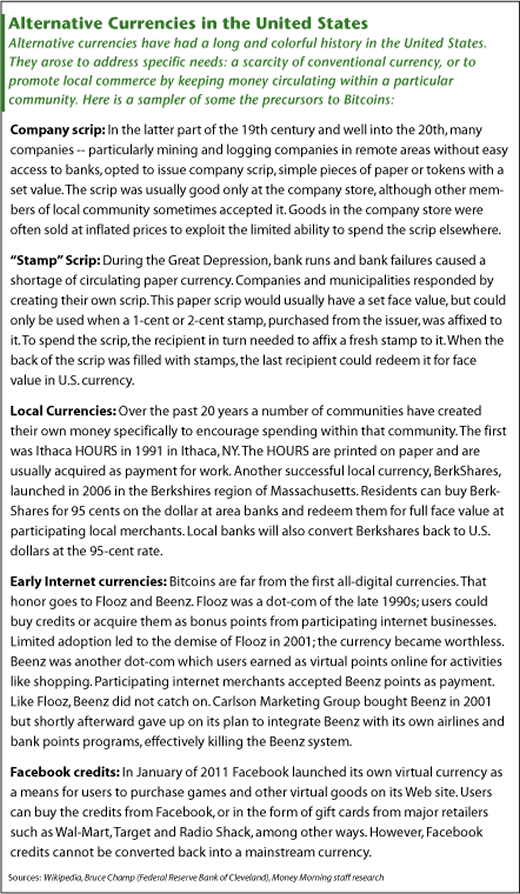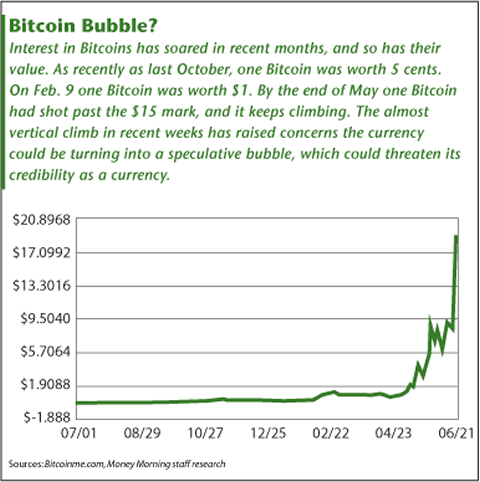Bitcoins Online Currency You Can Trade Like a Stock
Currencies / Fiat Currency Jun 16, 2011 - 06:55 AM GMTBy: Money_Morning
 David Zeiler writes: Chances are, you've never before heard of Bitcoins.
David Zeiler writes: Chances are, you've never before heard of Bitcoins.
So here's a quick primer: Imagine a type of money that you can't put in your pocket, that you can trade like a stock, that you can earn with your computer, that enables anonymous transactions, and most importantly, has skyrocketed in value 399,900% in the past year.
That's precisely what we're talking about with Bitcoins.
This new form of online currency arises not from a government central bank but from the electronic bits of the Internet itself, hence its name. No one controls it and it's available to anyone with an Internet connection.
Some consider Bitcoins the future of money, while others dismiss it as a short-lived fad, a flawed concept, or even a scam. When U.S. Sen. Charles Schumer (D-NY) discovered recently that some people were using Bitcoins to buy illegal drugs online, he branded it a "form of money laundering."
But regardless of anyone's personal opinion, the Bitcoin economy exists and is thriving. People are using them to buy and sell goods and they trade against most of the world's major currencies on exchanges like Mt. Gox. One Website, Bitcoincharts.com, tracks prices and trades on these exchanges, much like financial Websites track stock markets, commodity trades and foreign exchange rates.
There's even a tiny, nascent Bitcoin-based stock market, the Global Bitcoin Stock Exchange, which was created to provide companies too small to trade on major exchanges a place to raise capital.
"There is no doubt that one reason for all the interest in Bitcoins is that they are just kind of cool - the first such non-third-party-intermediated, totally electronic currency to come into even somewhat common use," writes Annie Lowrey in Slate.
Digital Mining
In some ways, Bitcoins are a modern-day version of other alternative currencies of the past, such as the company scrip of the late 19th century.

Satoshi Nakamoto, who wrote a white paper on the topic, created Bitcoins in 2009. Little is known of Nakamoto; other developers created the peer-to-peer network that enables the creation and security of the Bitcoin system.
The "coins" are "mined" by people who use their computers to solve a computation-heavy math problem. When a miner solves a "bit," they receive 50 Bitcoins.
But while mining appears a lucrative way to acquire Bitcoins, it requires a high-end graphics card and a great deal of patience. Most ordinary PCs would require years of non-stop mining to find one Bitcoin.
Most miners create machines dedicated to the task, investing hundreds or even thousands of dollars in graphics cards, and join pools to increase their odds of finding a bit, even though it means dividing the proceeds.
Don't think it's worth it? Consider the currency's recent rise.
As recently as last October, one Bitcoin was worth 5 cents. On Feb. 9, one Bitcoin was worth $1. And by the end of May, one Bitcoin had shot past the $15 mark.
Last Friday, the price of one Bitcoin nearly reached $30 before falling rapidly over the weekend to $10. But by Monday it was back up to about $20, where it has hovered since.
If you go back one year, a Bitcoin was worth just half a penny, resulting in an eye-popping increase of 399,900%.
The currency's volatility has made the Bitcoin exchanges a sort of hybrid stock market and currency market - but one that's open to anyone. Like foreign exchanges, they never close. But unlike most markets, no third party like a broker is required; users trade the currency directly with each other, although most exchanges charge a fee per trade.

Tight Supply, High Demand
So what's behind this meteoric rise in value?
Well, for one thing, the supply of Bitcoins is strictly controlled. Just one is created every 10 minutes. As more people add computing capacity to the system, the degree of difficulty rises to keep the rate steady.
Contrast that with the fiat currencies of the world, such as the U.S. dollar and the euro. Government central banks like the U.S. Federal Reserve have a habit of printing more money on a regular basis, spurring inflation and making existing currency worth less - a problem Bitcoins do not have.
Right now, there are 6.5 million Bitcoins. The online currency's creators set a maximum limit of 21 million coins, to be reached by the year 2040, to prevent future devaluation.
As more people have started to use Bitcoins, either for commerce or as an investment, their scarcity has driven up their value.
That leads to a phenomenon known as Gresham's Law, which says people don't spend money that is rapidly rising in value -- they hoard it. The hoarding takes most of the currency out of circulation, making it useless for commerce.
Earlier online currencies, such as Flooz and Beenz, failed for the opposite reason -- limited adoption -- and both companies were swallowed up in the dot-com bust.
Although you can't buy much with Bitcoins, a few online vendors accept them and at least one controversial entity - WikiLeaks, blocked from receiving donations via PayPal and major credit cards - now accepts Bitcoins.
Demand for the online currency is also coming from patrons of an online drug market called The Silk Road, which prefer Bitcoins because of the anonymity of the transactions. That's what has Sen. Schumer so upset.
Media attention from the Silk Road controversy and tech Websites enamored with the concept have introduced more and more people to Bitcoins, stirring up the market
"Much as a stock -- say shares of Apple Inc. (Nasdaq: AAPL) -- can rise dozens-fold on news and speculation, Bitcoins can see a great deal of volatility and offer great payoff to early adopters at the cost of great risk," writes Jason Mick for DailyTech.
From an investing standpoint, Bitcoins are certainly high-risk/high reward. People who acquired a lot of Bitcoins early for pennies and sat on them until now could cash in for a huge return. Some expect the value of a Bitcoin to continue to appreciate over time, with estimates rising as high as $100 or even $1,000.
It's also possible, though unlikely, that Bitcoins could lose almost all their value if people abandon them.
So far, the trend is the opposite -- Bitcoins are benefiting from the so-called "network effect." Like the phone system, the more users you have the more utility there is to the system and everyone in it.
Money of the Future
Some might question why anyone would bother with Bitcoins in the first place.
One big reason, of course, is anonymity, and not just for buying illegal drugs. A lot of people resent how credit card companies and online vendors track their purchasing habits, or want a way to donate money to controversial groups like WikiLeaks without being identified.
Bitcoins could also help residents of developing nations.
"Think of all of the people sending money in third-world countries and getting ripped off by outrageous transaction fees," Amir Taaki, one the currency's developers, told Smart Money. "Bitcoins are here to stay and the world will benefit."
Another advantage of Bitcoins is security. The created bits that constitute the currency use a very high level of encryption, and all transactions are verified by Bitcoin client software on every user's computer (called a node). And the bits are chained together back to the very first bit. Combined, you have a system that can't be compromised even by the power of all the world's supercomputers combined.
And the transactions are controlled by 34-character strings. For example, to receive a Bitcoin, a person would provide their 34-character "wallet ID." The entire network records every transaction -- and saves it -- so the full history of every Bitcoin is embedded in the network.
"It's more secure than even bank transactions," Donald Norman, a spokesman for the Bitcoin Consultancy,told Smart Money.
Finally, one Bitcoin can be divided not just into 100 pennies like a dollar, but to the eighth decimal place. That means you can conduct a transaction of .00000001, or one hundred millionth, of a Bitcoin. So if one Bitcoin did become worth $1,000, or even $10,000, small-denomination transactions would continue to be possible.
So if Bitcoins continue to attract more users, what might its ultimate role become?
It's unlikely to fulfill the role of reserve currency, Money MorningContributing Editor Martin Hutchinson said, because it's "too small and too deflationary."
Bitcoins probably won't replace a major fiat currency like the dollar for similar reasons.
But Bitcoins could possibly supplement gold as a haven for investors leery of shaky fiat currencies and erratic stock and bond markets, Hutchinson said, provided they do become widely accepted.
The most probable role for Bitcoins is one it has already started to play - as an alternative currency for the libertarian-minded, for those seeking anonymity in their transactions, and as yet another investment for currency traders.
There is some risk that governments might try to stop Bitcoins, either because of its use in the purchase of illegal goods or because they won't want it competing with their fiat currencies.
But they may find the online currency very difficult to stamp out. Since Bitcoins exist in a global peer-to-peer network, governments have no fixed target. There is no company to go after, no central Website to shut down.
Whatever the future holds for Bitcoins, it appears destined to affect how people view and use money.
Russ Roberts, professor of economics at George Mason University, thinks the online currency - if it continues to thrive - could have a desirable impact on fiat currencies.
"Competition is good, even between currencies," Roberts told Technology Review. "Perhaps the example of Bitcoin could influence the behavior of the Federal Reserve."
Source :http://moneymorning.com/2011/06/16/bitcoins-an-online-currency-you-can-trade-like-a-stock/
Money Morning/The Money Map Report
©2011 Monument Street Publishing. All Rights Reserved. Protected by copyright laws of the United States and international treaties. Any reproduction, copying, or redistribution (electronic or otherwise, including on the world wide web), of content from this website, in whole or in part, is strictly prohibited without the express written permission of Monument Street Publishing. 105 West Monument Street, Baltimore MD 21201, Email: customerservice@moneymorning.com
Disclaimer: Nothing published by Money Morning should be considered personalized investment advice. Although our employees may answer your general customer service questions, they are not licensed under securities laws to address your particular investment situation. No communication by our employees to you should be deemed as personalized investent advice. We expressly forbid our writers from having a financial interest in any security recommended to our readers. All of our employees and agents must wait 24 hours after on-line publication, or 72 hours after the mailing of printed-only publication prior to following an initial recommendation. Any investments recommended by Money Morning should be made only after consulting with your investment advisor and only after reviewing the prospectus or financial statements of the company.
Money Morning Archive |
© 2005-2022 http://www.MarketOracle.co.uk - The Market Oracle is a FREE Daily Financial Markets Analysis & Forecasting online publication.



